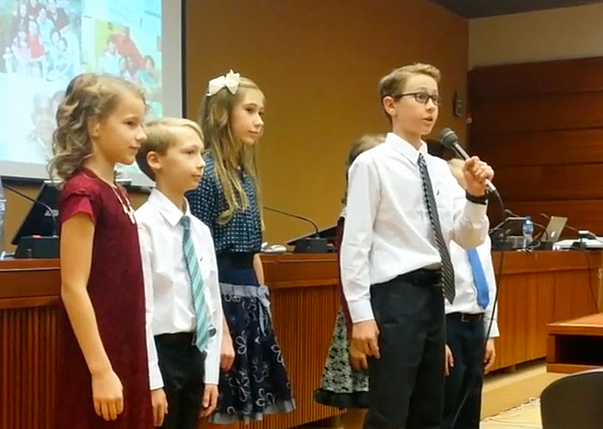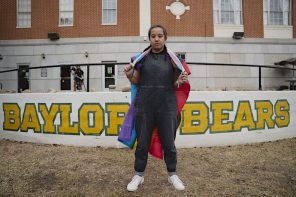If you had wandered into the hall on that afternoon of Friday, September 12, you might have been forgiven for assuming that you were witnessing a ceremony commemorating the Convention on the Rights of the Child, adopted 25 years ago (and still awaiting ratification by Somalia, South Sudan, and the United States of America).
In the spacious Room XXIII of the Palais des Nations, home of the United Nations Human Rights Council in Geneva, six pre-adolescent children were declaiming a text that sounded very human-rights-ish, with articles—one for each youth—on protecting, respecting, and establishing a number of things.
But if you had listened carefully, everything would have started to sound a bit off.
The text being read was in fact not the 1989 human rights treaty but instead “A Declaration on the Rights of Children and Their Families: A Call From the Children of the World.” The subject of the event was not as the protection of children as such but the “protection of the family,” and the non-governmental organization hosting it was called the UN Family Rights Caucus.
Discourse about the family is now the fulcrum of a major struggle over the human rights of sexual and gender minorities at the UN. In this struggle, American conservatives are claiming ground globally that they are losing locally in the national shift towards marriage equality.
Do it for the families
The rhetoric of the “Declaration on the Rights of Children and Their Families” is crafty, if not particularly well-crafted. Its six brief articles constitute a mash-up of the sort of language found in aspirational or non-binding resolutions, such as those routinely debated and passed at the Human Rights Council, and the distinct sort of language appropriate to legally binding treaties—referring to nation-state “parties” to the agreement, of which there are of course none in this case.
The contents of the Declaration, as well as its pseudo-legal tone, reveal it immediately as a polemic. It supplies us with a primer on the ongoing rhetorical appropriation of human rights discourse on the family by U.S. conservative activists and a coalition of UN member states, helpfully condensed onto three handsome sheets of parchment paper.
The “right to life” in Article I extends to unborn life:
Whereas the child, by reason of his physical and mental immaturity needs special safeguards and care, including appropriate legal protection, before, as well as after birth.
Article II, “Each Child has the Right to a Family,” draws on canonical language from the 1948 Universal Declaration of Human Rights (UDHR):
Recognizing that the family is the natural and fundamental group unit of society and is entitled to protection by society and the State.
In Article III we learn that this right to a family is “the right to a married mother and father.”:
Recognizing that children and youth who reside in a stable, intact family with a married mother and father, generally exhibit greater well-being in every measurable indicator including physically, socially, emotionally, economically and academically; and that the child shall have the right, as far as possible, to know and be cared for by his or her parents (CRC Art. 7);
We call upon States Parties and the United Nations system to discourage sexual relations and childbearing outside of the marital bond, and to promote the institution of marriage as the best environment for children.
The article on religion is noteworthy for affirming a positive “Right to a Religion”—in contrast to freedom of thought, conscience, and religion, the standard in accepted international instruments. Here again, the Declaration cites the UDHR but omits its crucial inclusion of the “freedom to change” belief and highlights “the right of parents to guide the moral and religious education of their children.”
Thus, it exemplifies one conservative response to the challenge of children’s rights of conscience: to subordinate them utterly to the rights of parental autonomy.
International law wonks may note that in embracing the rights of “the family” and the rights of children to faith-based and faithful heterosexual parents, the Family Rights Caucus is contradicting two common conservative impulses when it comes to human rights. The first is to reject so-called collective rights. Rights are said to belong to individual persons, not to collective entities such as families, except in the derivative sense that individuals are entitled by their individual rights to be in collectivities in various ways.
The other conservative impulse is to reject so-called positive rights, rights that are said to place a heavy burden on states to provide something to the rights-holders (in contrast to negative rights, which merely obligate states to refrain from interfering in their exercise). The positive-negative distinction is often mapped onto the distinction between supposedly positive social, economic, and cultural rights and supposedly negative civil and political rights— a flashpoint since the Cold War confrontation between communism and the capitalist democracies. (For a succinct critique of this mapping, see Jack Donnelly, Universal Human Rights in Theory and Practice.)
Perhaps unwittingly, the Declaration’s take on children’s rights would obligate states to do no less than to provide two hetero guardians for all children and to prevent these parents from straying either from each other or from the bosom of Abraham—positive rights that apparently God himself cannot satisfy.
Appropriating human rights
Who is the UN Family Rights Caucus? I asked Michael De Dora, who was at the Human Rights Council in his capacity as the UN representative for the Washington-based secularist NGO Center for Inquiry (full disclosure: a position I once held). He pointed me to co-moderator, Sharon Slater, a conservative Mormon who is notorious among progressives for her globetrotting activism against LGBTQ equality and public health policies that include condom use.
Slater’s Family Watch International (FWI) has been deeply involved in promoting abstinence-and fidelity-only initiatives in Uganda and has praised Nigeria—where same-sex couples can face up to 14 years in prison or stoning at the hands of Sharia courts—as “a strong role model” for other regional governments “on how to hold on to their family values despite intense international pressure.”
The Human Rights Campaign has reported that FWI’s annual, invitation-only global policy forum for UN delegates often includes testimonials from people “cured” of “homosexuality” by conversion therapy. According to FWI literature, “so-called ‘homosexual rights’ are driving much of the current worldwide assault on marriage, the family and family related issues.”
Nevertheless, the Caucus’ discourse linking the family to children’s rights and global developmental is not without scholarly and evidentiary respectability. At the Geneva symposium, a former dean of the J. Reuben Law School at Brigham Young University (and a Mormon elder), Bruce C. Hafen, presented a sophisticated analysis of the Convention on the Rights of the Child—which even sympathetic commentators concede is a conceptual mess.
And W. Bradford Wilcox presented empirical research linking family characteristics with important measures of child health and wellbeing. Wilcox, director of the National Marriage Project at the University of Virginia and a visiting scholar at the American Enterprise Institute, may be familiar to many readers for his frequent contributions to the Atlantic and Slate, in which he offers evidence-based arguments for the economic and social benefits of two-parent married households.
FWI has been a major player in the push to insert protection of the family—the traditional family—into what are called the UN’s post-2015 development goals, the successor to the Millennium Development Goals. The group’s website declared victory with the adoption of a resolution on the protection of the family at the 26th session of the Human Rights Council. During the debate, a representative of the Caucus sparred with a representative of Amnesty International over the inclusion of ‘various forms of the family’ in the language.
The amendment was defeated by a “no action” procedural rule late in the debate and the resolution passed with support from a coalition of twenty-six nations including Saudi Arabia, Pakistan, China, India, Venezuela, Russia, and the African Group. Opposing the resolution were Austria, Chile, Czech Republic, Estonia, France, Germany, Ireland, Italy, Japan, Montenegro, Korea, Romania, UK, and the United States.
Reprisals are expected during the current session of the Council. The positioning of “the family” as the best protector of children’s health and rights is the latest in a large-scale and ongoing appropriation of human rights rhetoric in the service of global campaigns against the rights of sexual and gender minorities—rights that are far from secure in international law.





